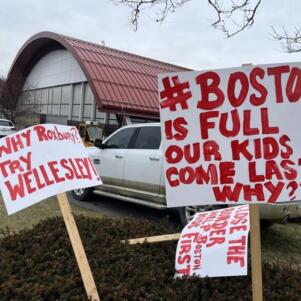New rules clarify ‘cooperation’ between candidates, super PACs
By State House News Service | February 25, 2016, 12:00 EST
 Office of Campaign and Political Finance Director Mike Sullivan leads hearing on new rules clarifying how candidates, campaigns and super PACs interact. (Antonio Caban/SHNS)
Office of Campaign and Political Finance Director Mike Sullivan leads hearing on new rules clarifying how candidates, campaigns and super PACs interact. (Antonio Caban/SHNS) BOSTON — Charting the borders of acceptable activity between candidate campaigns and super PACs that can spend unlimited sums, the state’s campaign finance regulator is set to finalize new rules to guard against coordination.
“We get complaints all the time, so we’re trying to create a roadmap,” Office of Campaign and Political Finance Director Michael Sullivan told the News Service after a hearing on the draft regulations on Wednesday.
Office of Campaign and Political Finance Director Mike Sullivan leads hearing on new rules clarifying how candidates, campaigns and Super PACs interact. [Photo: Antonio Caban/SHNS]
The 2010 U.S. Supreme Court decision in Citizens United v. the Federal Election Commission established that outside groups can spend unlimited amounts of money seeking to sway an election.
Outside expenditure groups were already prohibited by state law from coordinating with a candidate before the Supreme Court decided they could raise and spend unlimited amounts. A 2014 state law required the independent expenditure groups, known as super PACs, to disclose their funding sources.
Under the Office of Campaign and Political Finance’s draft regulations, political consultants working concurrently for both a candidate and a super PAC would be presumed to be coordinating. That presumption could be rebutted if the consultant is operating under a “written firewall policy.”
Other circumstances that would be presumed to constitute coordination would be an immediate family member of a candidate working for a super PAC, a super PAC hiring a candidate’s former staffer, or a candidate appearing as a “speaker or draw” at a fundraiser for a super PAC benefitting the candidate.
Super PACs are allowed to use publicly available information, and candidates around the country facing competitive races have publicly released photos and videos seemingly designed to be repurposed by an outside group.
“We haven’t totally addressed that yet. We’re going to look at that a little bit further in terms of the final regulation, but it’s something that’s certainly on our mind,” Sullivan said, referring to the practice of releasing “B-roll.”
Attending Wednesday’s hearing were three representatives from the Massachusetts Teachers Association and a representative of the Massachusetts Association of Realtors – both of which have been involved with super PACs.
Candidates are more hindered in their ability to raise money than super PACs. A year ago, the cap on annual donations to candidates went up to $1,000, from the prior $500 limit.
Ryan Dunn, from the teachers union, described the draft regulations as “thoughtful” and quizzed Sullivan about how Massachusetts compares to other jurisdictions.
“I think California’s at the forefront right now. They’re very aggressive in their regulations. Ours may not be as aggressive,” said Sullivan, who said Massachusetts is “ahead” of the Federal Election Commission on disclosure requirements.
Sullivan encouraged people who could be affected by the regulations to seek advisory opinions. The period for written comments on the draft regulations will remain open until 5 p.m. on March 4.
The office has the power to investigate potential violations and reach disposition agreements or refer matters to the state’s top law enforcement officer.
“Our big stick so to speak is referral to the attorney general,” Sullivan said.










